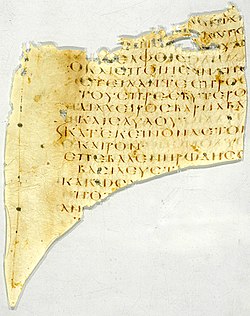Acts 12: Difference between revisions
→Locations: Add outside flag to places that are on the edge of the map, prevents a map error |
JohnThorne (talk | contribs) →Verse 12: add text and ref |
||
| Line 66: | Line 66: | ||
===Verse 12=== |
===Verse 12=== |
||
: ''So, when he (Simon Peter) had considered this, he came to the house of Mary, the mother of John whose surname was Mark, where many were gathered together praying.''<ref>{{bibleref2|Acts|12:12|NKJV}} NKJV</ref> |
: ''So, when he (Simon Peter) had considered this, he came to the house of Mary, the mother of John whose surname was Mark, where many were gathered together praying.''<ref>{{bibleref2|Acts|12:12|NKJV}} NKJV</ref> |
||
===Verse 17=== |
|||
:''But motioning to them with his hand to keep silent, he declared to them how the Lord had brought him out of the prison. And he said, "Go, tell these things to James and to the brethren." And he departed and went to another place.''<ref>{{bibleref2|Acts|12:17|NKJV}} NKJV</ref> |
|||
*"Motioning... with ''his'' hand" (KJV: "Beckoning...with the hand"): translates Greek phrase {{lang|grc|Κατασείειν τῇ χειρί}}, ''{{Strong-number|kataseisas|G|2678}} {{Strong-number|tē|G|3588}} {{Strong-number|cheiri|G|5495}}'',<ref>[https://biblehub.com/text/acts/12-17.htm Greek Text Analysis: Acts 12:17]. Biblehub</ref> "to make a shaking motion with the hand" (cf. {{bibleverse|Acts|13:16|KJV}}, {{bibleverse|Acts|19:33|KJV}}, {{bibleverse|Acts|21:40|KJV}}), to indicate 'a wish to bring forward something', seeking 'the silence and attention of those present'.<ref name=meyer>[http://biblehub.com/commentaries/meyer/acts/12.htm Meyer's NT Commentary on Acts 12]. Accessed 24 April 2019.</ref> |
|||
== Verse 23 == |
== Verse 23 == |
||
Revision as of 07:43, 26 October 2019
| Acts 12 | |
|---|---|
 Acts 11:29–12:2 on the recto side of Uncial 0244 (Gregory-Aland) from the 5th century. | |
| Book | Acts of the Apostles |
| Category | Church history |
| Christian Bible part | New Testament |
| Order in the Christian part | 5 |
Acts 12 is the twelfth chapter of the Acts of the Apostles in the New Testament of the Christian Bible. It records the death of the first apostle, James, son of Zebedee, followed by the miraculous escape of Peter from prison, the death of Herod Agrippa I, and the early ministry of Barnabas and Paul of Tarsus. The book containing this chapter is anonymous, but early Christian tradition uniformly affirmed that Luke composed this book as well as the Gospel of Luke.[1]
Text

The original text was written in Koine Greek. This chapter is divided into 25 verses.
Textual witnesses
Some early manuscripts containing the text of this chapter are:
- Codex Vaticanus (AD 325–350)
- Codex Sinaiticus (330–360)
- Codex Bezae (~400)
- Codex Alexandrinus (400–440)
- Codex Laudianus (~550)
Locations
This chapter mentions the following places:
Timescale
Meyer estimated that these events took place in 44 AD, [2] the year of the death of Herod Agrippa, at the same time as the prophets from Jerusalem travelled to Antioch and returned with aid for the Judean church.[3] The Cambridge Bible for Schools and Colleges suggests 43 AD.[4]
Peter Freed from Prison
This part of the chapter tells that Peter was put into prison by King Herod, but the night before his trial an angel appeared to him, and told him to leave. Peter's chains fell off, and he followed the angel out of prison, thinking it was a vision (verse 9). The prison doors opened of their own accord, and the angel led Peter into the city.
-
Bartolomé Esteban Murillo, Liberation of St. Peter
-
Antonio de Bellis, The Liberation of St. Peter.
Verse 7
- Now behold, an angel of the Lord stood by him, and a light shone in the prison; and he struck Peter on the side and raised him up, saying, “Arise quickly!” And his chains fell off his hands.[5]
This verse is referred to in Charles Wesley's hymn And Can It Be.[6]
Verse 12
- So, when he (Simon Peter) had considered this, he came to the house of Mary, the mother of John whose surname was Mark, where many were gathered together praying.[7]
Verse 17
- But motioning to them with his hand to keep silent, he declared to them how the Lord had brought him out of the prison. And he said, "Go, tell these things to James and to the brethren." And he departed and went to another place.[8]
- "Motioning... with his hand" (KJV: "Beckoning...with the hand"): translates Greek phrase Κατασείειν τῇ χειρί, kataseisas tē cheiri,[9] "to make a shaking motion with the hand" (cf. Acts 13:16, Acts 19:33, Acts 21:40), to indicate 'a wish to bring forward something', seeking 'the silence and attention of those present'.[10]
Verse 23
- Then immediately an angel of the Lord struck him (Herod), because he did not give glory to God. And he was eaten by worms and died.[11]
Verse 25
- And Barnabas and Saul returned from Jerusalem when they had fulfilled their ministry, and they also took with them John whose surname was Mark.[12]
See also
References
- ^ Holman Illustrated Bible Handbook. Holman Bible Publishers, Nashville, Tennessee. 2012.
- ^ Meyer's NT Commentary, http://biblehub.com/commentaries/meyer/acts/12.htm accessed 30 August 2015
- ^ Acts 11:27–30
- ^ http://biblehub.com/commentaries/cambridge/acts/12.htm accessed 30 August 2015
- ^ Acts 12:7 NKJV
- ^ Blair Gilmer Meeks, Expecting the Unexpected: An Advent Devotional Guide (Upper Room Books, 2006), 38.
- ^ Acts 12:12 NKJV
- ^ Acts 12:17 NKJV
- ^ Greek Text Analysis: Acts 12:17. Biblehub
- ^ Meyer's NT Commentary on Acts 12. Accessed 24 April 2019.
- ^ Acts 12:23
- ^ Acts 12:25



